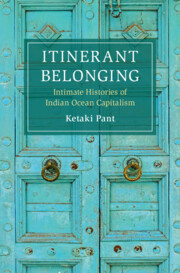178 results
1 - Inhabited Histories
-
- Book:
- Itinerant Belonging
- Published online:
- 10 April 2025
- Print publication:
- 17 April 2025, pp 36-74
-
- Chapter
- Export citation
Chapter 2 - Latinx Internationalism, French Orientalism, and a Nuyorican Morocco
- from Part I - Space
-
-
- Book:
- Latinx Literature in Transition, 1848–1992
- Published online:
- 10 April 2025
- Print publication:
- 17 April 2025, pp 37-53
-
- Chapter
- Export citation

Itinerant Belonging
- Intimate Histories of Indian Ocean Capitalism
-
- Published online:
- 10 April 2025
- Print publication:
- 17 April 2025
Factors Related to Current Level of Knowledge and Skills of Psychological First Aid Among Health Care Providers for Africa and the Global South: A Systematic Review
-
- Journal:
- Disaster Medicine and Public Health Preparedness / Volume 19 / 2025
- Published online by Cambridge University Press:
- 07 April 2025, e85
-
- Article
- Export citation
South–South cooperation: What can we learn from South–South security cooperation?
-
- Journal:
- European Journal of International Security , First View
- Published online by Cambridge University Press:
- 07 April 2025, pp. 1-11
-
- Article
-
- You have access
- Open access
- HTML
- Export citation
South–South security cooperation and the (re)making of global security governance
-
- Journal:
- European Journal of International Security , First View
- Published online by Cambridge University Press:
- 07 April 2025, pp. 1-20
-
- Article
-
- You have access
- Open access
- HTML
- Export citation
Survey sampling in the Global South using Facebook advertisements
-
- Journal:
- Political Science Research and Methods , First View
- Published online by Cambridge University Press:
- 02 April 2025, pp. 1-17
-
- Article
-
- You have access
- Open access
- HTML
- Export citation
Supporting parents in the Global South: implementation of a faith-based parent program in 12 countries
-
- Journal:
- Cambridge Prisms: Global Mental Health / Volume 12 / 2025
- Published online by Cambridge University Press:
- 05 March 2025, e37
-
- Article
-
- You have access
- Open access
- HTML
- Export citation
The “Hairs of Hope”: Toward a Fuller Understanding of the Legal, Material, and Social Infrastructure of Infrastructure
-
- Journal:
- German Law Journal / Volume 25 / Issue 8 / November 2024
- Published online by Cambridge University Press:
- 26 February 2025, pp. 1407-1416
-
- Article
-
- You have access
- Open access
- HTML
- Export citation
Chapter 39 - “I Wish I Could Be Like a Tree”
-
-
- Book:
- Pillars of Developmental Psychology
- Published online:
- 14 February 2025
- Print publication:
- 20 February 2025, pp 445-457
-
- Chapter
- Export citation
Chapter 38 - Global South Developmental Psychology: Using Native Lenses
-
-
- Book:
- Pillars of Developmental Psychology
- Published online:
- 14 February 2025
- Print publication:
- 20 February 2025, pp 434-444
-
- Chapter
- Export citation
Chapter 6 - Studying Children in Sociocultural Context: A Widening Journey
-
-
- Book:
- Pillars of Developmental Psychology
- Published online:
- 14 February 2025
- Print publication:
- 20 February 2025, pp 55-67
-
- Chapter
- Export citation
The Cold War as a label, meaning, and referent
-
- Journal:
- Social Science History , First View
- Published online by Cambridge University Press:
- 14 February 2025, pp. 1-18
-
- Article
-
- You have access
- Open access
- HTML
- Export citation
12 - International Organizations and Peaceful Change
- from Part III - Practice
-
-
- Book:
- International Organizations and Peaceful Change in World Politics
- Published online:
- 30 January 2025
- Print publication:
- 06 February 2025, pp 273-298
-
- Chapter
- Export citation
Some Personal Reflections on Enhancing Global North – Global South Academic Cooperation in Legal Higher Education in the Era of Artificial Intelligence
-
- Journal:
- International Journal of Legal Information , First View
- Published online by Cambridge University Press:
- 03 February 2025, pp. 1-10
-
- Article
-
- You have access
- Open access
- HTML
- Export citation
The women’s inclusion agenda: Gender and everyday practices across registers of finance
-
- Journal:
- Finance and Society / Volume 11 / Issue 1 / April 2025
- Published online by Cambridge University Press:
- 27 January 2025, pp. 81-102
-
- Article
-
- You have access
- Open access
- HTML
- Export citation
Chapter 3 - The Global South
-
-
- Book:
- The New Nineteenth-Century American Literary Studies
- Published online:
- 02 January 2025
- Print publication:
- 23 January 2025, pp 39-52
-
- Chapter
- Export citation
Reforming ESG: a European and Global South perspective
-
- Journal:
- Environment and Development Economics , First View
- Published online by Cambridge University Press:
- 13 January 2025, pp. 1-15
-
- Article
-
- You have access
- Open access
- HTML
- Export citation
1 - Introduction
-
-
- Book:
- Digital Sovereignty in the BRICS Countries
- Published online:
- 31 December 2024
- Print publication:
- 02 January 2025, pp 1-38
-
- Chapter
-
- You have access
- Open access
- HTML
- Export citation
Need For Fairness In Climate Change Negotiations: A Third World Perspective
-
- Journal:
- Asian Journal of International Law / Volume 15 / Issue 1 / January 2025
- Published online by Cambridge University Press:
- 07 February 2025, pp. 157-189
- Print publication:
- January 2025
-
- Article
-
- You have access
- HTML
- Export citation


